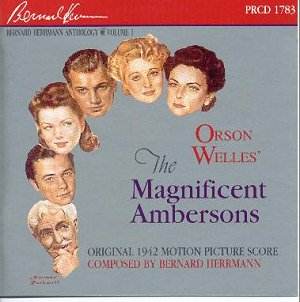| **************************************************************
EDITOR’s RECOMMENDATION September
2000
************************************************************** |
Bernard HERRMANN
The Magnificent Ambersons
 Australian Philharmonic Orchestra
conducted by Tony Bremner
Australian Philharmonic Orchestra
conducted by Tony Bremner
 PREAMBLE
PRCD1783
[51:32]
PREAMBLE
PRCD1783
[51:32]
Crotchet

Orson Welles' The Magnificent Ambersons, (RKO Radio 1942) followed
Citizen Kane which was not, initially, the success it is today;
therefore the studio imposed more strictures on Welles and his Amberson's
venture. Following preview audience's apathetic reaction, the studio re-shot
several scenes and cut the original 131 minute duration to the 88 minute
screenplay we know today. Tragically, in a studio clear-out, all the unused
footage that Welles shot was destroyed so we have a very incomplete version
of Welles vision, his adaptation of the Both Tarkington novel that had so
fascinated him. These facts and many more fascinating details are revealed
in the lavish booklet that comes with this fine Preamble re-release.
The inside front cover is devoted to a fascinating analysis/segmentation
of the scenes of the 131 minute long version, and an equally absorbing account
of the production of the film follows; plus a scene-by-scene synopsis in
which Hermann's music cues are positioned. There is also a fulsome article
on Herrmann's compositional response to the screenplay. It appears that half
of Herrmann's score was removed from the soundtrack of the released shorter
version and worse that Roy Webb was engaged to write for the extra scenes
demanded by the studio after the disastrous preview. Herrmann vituperatively
threatened legal action unless his name was removed as well. With that he
bitterly severed ties with the film and remembered it with the deepest regret
to the end of his life.
Herrmann uses, but develops considerably material from Waldteufel's
Toujours au jamais ('Always and never'). This Walteufel material
proves to be a powerful and versatile unifying device with the 'always and
never' theme making a shrewd comment on the narrative's core dramatic issues.
The early music, the seven-minute opening cue 'Theme and Variations; George's
Homecoming' sets the early scenes showing the Ambersons in their magnificence.
The music speaks of their rich cosy lives; softly shifting harp arpeggios
and high strings seem to speak of lace curtains swaying gently in the breeze
protecting large, elegant, heavily furnished rooms away from the prying eyes
of the riff-raff as the boorish, bullying son George describes the poorer
townsfolk. Many of these lighter variations suggest genteel horse and carriage
rides, with the occupants proud and haughty and the horses perfectly groomed
and disciplined. Through the variations the tempi vary moving from the sedate
to the scurrying. Finally, homely music on the celeste, very much in the
manner of a musical box, re-establishes the feeling of old-world chintz.
The pleasanter aspects of the score resurface in such cues as the glittering
'Snow Ride' and the innocence of the 'Pleasure Trip'. Darker music underscores
the malign machinations of George ruining the romance of his widowed mother,
Isabel and her old admirer, Eugene; plus the downfall of the Ambersons through
ill-advised investments and George's spend-thrift irresponsibility and arrogance.
Contastingly tender music for the plight of George's doting but ineffective
and crushed mother and her romance with Eugene comes in a number of other
cues including 'Garden scene, Second Letter scene: Romanza and the First
Nocturne with its delicious violin solo. The second nocturne with a solo
cello is more introspective and poignant. As always Herrmann's orchestrations
are very impressive and add considerably to the drama of the scenes.
This is one of Bernard Herrmann's masterpieces. Tender and lyrical, witty
and ironic -- and sinister in its depiction of the corrosive effects of family
tensions and jealousies.
Recommended unreservedly.
Ian Lace

![]()
![]()
![]()
![]()
![]()
![]()
![]()
![]()
![]()
![]()
![]()
![]()
![]()
![]()
![]()
![]()